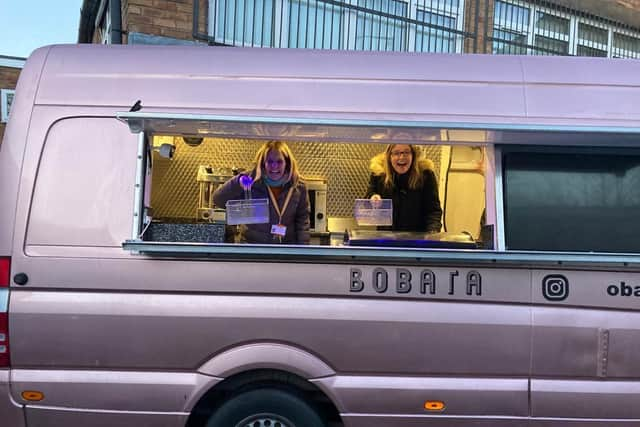Supporting vulnerable people to access food – a Leamington woman’s story
and live on Freeview channel 276
A Leamington woman battling alcohol addiction has been helped back on her feet with the support of a community project Helping Hands - boosted by funding from Warwickshire County Council.
Helping Hands assists individuals and low-income families through issues such as homelessness, food poverty, domestic abuse, addiction and mental health issues.
Advertisement
Hide AdAdvertisement
Hide AdVolunteers serve warm food, sandwiches, cakes and fruit from their Althorpe Street drop-in centre in Leamington and the Gateway Café, Warwick.


The group also provides clients with volunteering and educational opportunities as well as information about other relevant support available.
Last year, the group referred one of their clients, Claire* (not her real name), to a drugs/alcohol rehabilitation centre due to her alcohol addiction - she is now back home and once again able to live with her family.
Assisted with a grant of £37,730 from the County Council, Helping Hands was able to fund a mobile catering van.
Advertisement
Hide AdAdvertisement
Hide AdTo help Claire maintain her sobriety, the group provided her with a volunteering opportunity – helping to set up and run the mobile kitchen.
This involved preparing food; cleaning; labelling food supplies and equipment; building a storage shelving unit; serving drinks and washing up.
The catering van operates outside the Althorpe Street drop-in and serves around 40-70 people four evenings per week.
The mobile kitchen also meant the group could continue to feed local people struggling through the Covid-19 pandemic who were self-isolating and unable to attend local food bank services.
Advertisement
Hide AdAdvertisement
Hide AdFunding for the food van came from the County Council’s £520,000 share of the Government’s £63m Covid-19 Local Authority Emergency Access Funding for Food and Essential Supplies distributed to local authorities in England.
Claire says: “Volunteering has been a huge distraction to help me stay sober and I’ve loved feeling a part of the charity, helping get the van set up and helping in the food stores.”
Lianne Kirkman CEO of Helping Hands says: “Our ethos is to offer ‘a hand up, not just a hand out’.
"As well as benefiting from the food we serve, we have provided Claire, and several other clients, with the opportunity to be involved in the set up and preparations to open the mobile catering van.
Advertisement
Hide AdAdvertisement
Hide Ad"We are so happy things are working out for Claire - she has also just completed her food hygiene certificate online, and will be starting her Barista training course on the new coffee machine - as soon as restrictions are lifted.
Lianne continues: “But most importantly, Claire has become part of the team, gained new friendships and greater confidence. Now her future is so much brighter than it was - there is no end to what she can achieve.”
Cllr Heather Timms, Portfolio Holder for Environment and Heritage and Culture said: “Stories like Claire’s are exactly what make projects like Helping Hands so worthwhile.
"The County Council is delighted to have been able to support this wonderful initiative.
Advertisement
Hide AdAdvertisement
Hide Ad"Helping Hands is an excellent example of people working together to support the members of our community who are struggling the most.”
Helping Hands was awarded the funding after community groups were invited to put forward bids for funding to address food poverty during the Covid pandemic.
In total, 29 projects met the criteria and have been supported out of the Government’s Covid-19 Emergency Assistance funding.
The funding has supported a range of initiatives supporting the most vulnerable residents including community cafes, fruit and veg bags, a community kitchen, mobile food banks, expansion of local food banks to provide chilled food and much more.